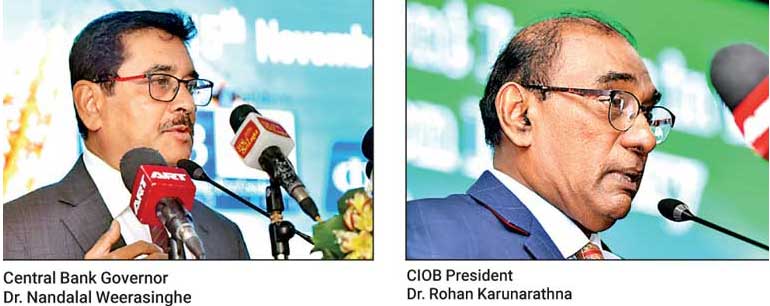Saturday Feb 21, 2026
Saturday Feb 21, 2026
Saturday, 26 November 2022 00:02 - - {{hitsCtrl.values.hits}}

By Darshana Abayasingha
Ceylon Institute of Builders President Dr. Rohan Karunarathna last week charged that 60% of construction projects in the country are non-essential and noted the Chamber of Construction Industry has formulated a taskforce to advice the Government on what projects will really benefit the country.
Speaking at a seminar on the construction industry crisis, Dr. Karunarathna found it “pathetic” for the Government to say the industry will have no work over the next two years and likened it to the disruption caused by the ban on chemical fertilisers.
Over 600,000 persons have already been laid off and stated it was amusing how the Government anticipates these persons to survive on just Rs. 5,000 a month; having usually earned up to Rs. 70,000 from the industry.
The keynote speech at the event was delivered by Central Bank Governor Dr. Nandalal Weerasinghe, who advised the industry to stop relying on Government-funded projects. Dr. Weerasinghe, speaking in his personal capacity, said the construction industry in Sri Lanka has for far too long profited from Government projects that were funded through borrowings or tax-payer money and remarked this was unsustainable.
“We have to think anew. If you look at our history, we have always had challenges for this industry. Almost 90% are Government-funded projects. Look at developed markets, it is not Government-funded projects that drive growth. When an industry develops through taxpayer money there are risks and limits to growth.
“At times when the Government was unable to pay, the Treasury has issued letters to constructors assuring payment. Contractors use that piece of paper to borrow money from banks. The banks have also lent based on the document; this is not a good case of risk management all round,” he said.
Dr. Weerasinghe added he is aware the industry has also made large profits of over 40% through some projects and called on the industry to develop its technology, capacity and compete in the non-Government sector both locally and globally. He harked back to his past and reminisced his 15 years of experience in the construction industry working with his father in Hambantota. Dr. Weerasinghe joked he would have been wealthier had he remained in construction and not joined the Central Bank.
Through this seminar, the Ceylon Institute of Builders planned to educate Government and funding agencies on the present plight of the industry and sought support to survive the next two years. Dr. Karunarathna called for assistance to release contractors from banks by provision of soft loans to settle part of their debts and restructure remaining facilities.
He asked the Government to identify important projects and continue these developments, and to conduct a survey to identify existing buildings that are not used to capacity. He also suggested the setup of an infrastructure fund to support the industry in its expansion here and overseas through the provision of guarantees.